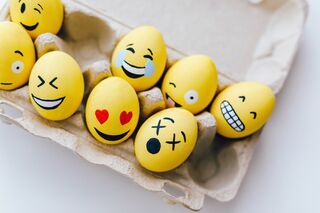Relationships
Learning to Love the Blues
There are creative superpowers hidden inside your negative emotions.
Posted February 2, 2022 Reviewed by Davia Sills
Key points
- A new trend focuses on the unexpected benefits of leaning into negative emotions.
- The pandemic is helping people reexamine the creative value of complex feelings.
- Embracing the dissonance of negative emotions opens people up to greater fulfillment and creative engagement.

No longer should we fear, scoff, or sequester feelings that once seemed taboo, alien, problematic, or downright shameful. A global pandemic has us recognizing that we can’t really avoid these emotions, so why not join them? With Daniel Pink’s The Power of Regret: How Looking Backward Moves Us Forward, Susan Cain’s Bittersweet: How Sorrow and Longing Make Us Whole, and Brene Brown’s Atlas of the Heart, a newfound appreciation is bubbling up for the so-called negative emotions.
As I’ve developed my own work, characterizing therapists as jazz musicians who help clients embrace dissonance so they can make more interesting music, I never expected a renaissance of the Blues. In a dystopian age, who would think any music could come from such noise? And yet, here we are, stumbling our way back to creativity out of some of the most unexpected and strange changes we’ve all been forced to confront.
A soprano’s story
She lost it again. It was the third time this week Elizabeth had tried to sing an aria, and nothing came forth. “Can’t you give me any relaxation or breathing techniques or some kind of first aid for these panic attacks? I can’t continue like this!” A coloratura soprano normally comfortable in the vocal stratosphere, Elizabeth wanted to get away from the problem quickly, but we needed to lean into the dissonance first.
Exquisitely tuned into her teacher’s need to be right and in control, Elizabeth unconsciously sabotaged herself when asked to sing for and as someone other than herself. But she couldn’t allow herself to stay with this dissonance, for it threatened to brand her as a traitor, just as in her family of origin, if she didn’t take care of her parent’s emotional vulnerabilities and insecurities.
When I gave Elizabeth permission to stay with her justifiable conflict—lose her mentors or herself—something opened up. We articulated the fear and terror of losing those she truly needed and spoke out loud her desire to maintain her own literal and metaphorical voice. Going into and through the dissonance—approaching rather than avoiding her negative emotions—allowed us, as in Pink, Cain, and Brown’s work, to find her hidden superpower.
Leaning into the dissonance of negative emotions
Such is the counterintuitive power we all need to tap into if we are to gain something of value from these difficult times. Both inside and outside of therapy, many seek the instant gratification of staying with the most easily available emotions and, understandably, with the positive ones. And yet, we get closest to our most creative and integrated self by staying through the dissonant negative emotions. Ironically, we reclaim and recover long-buried talents and capacities we didn’t realize were in us or available in this world.
I told Elizabeth, “It makes sense why you’re so caring and sensitive to your teacher’s needs. Your capacity to really listen to tone is what makes you such a wonderful singer. And yet, we need to make sure you don’t take ownership for what is their tension and not yours!”
She replied, “I always felt I just had to go along with my teachers and family because I needed them so much. What if you’re right? What if they needed me more than I thought?”
“What if you had more strength than you actually knew? That’s what you deserve to tap into to get your voice back again. And it’s yours for the taking!” I smiled with a verbal wink as if to say, ‘Isn’t this great news?’
Whether spurred by the pandemic’s heartbreak, isolation, and grief, or our culture’s disintegrating bonds of connection and meaning, the news from writers like Brown, Cain, and Pink is refreshing, vital, and sorely needed right now. We must learn and rediscover the lost art of tapping into the Blues—our psychological dissonances—in order to emerge more alive, authentic, and fulfilled.
It’s not easy to allow ourselves to stay open to these moments, because as Leonard Cohen confessed, “It’s a cold and it’s a broken Hallelujah.” Never mind. I’ll take a hallelujah that’s real and true now more than ever. Wouldn’t you?


